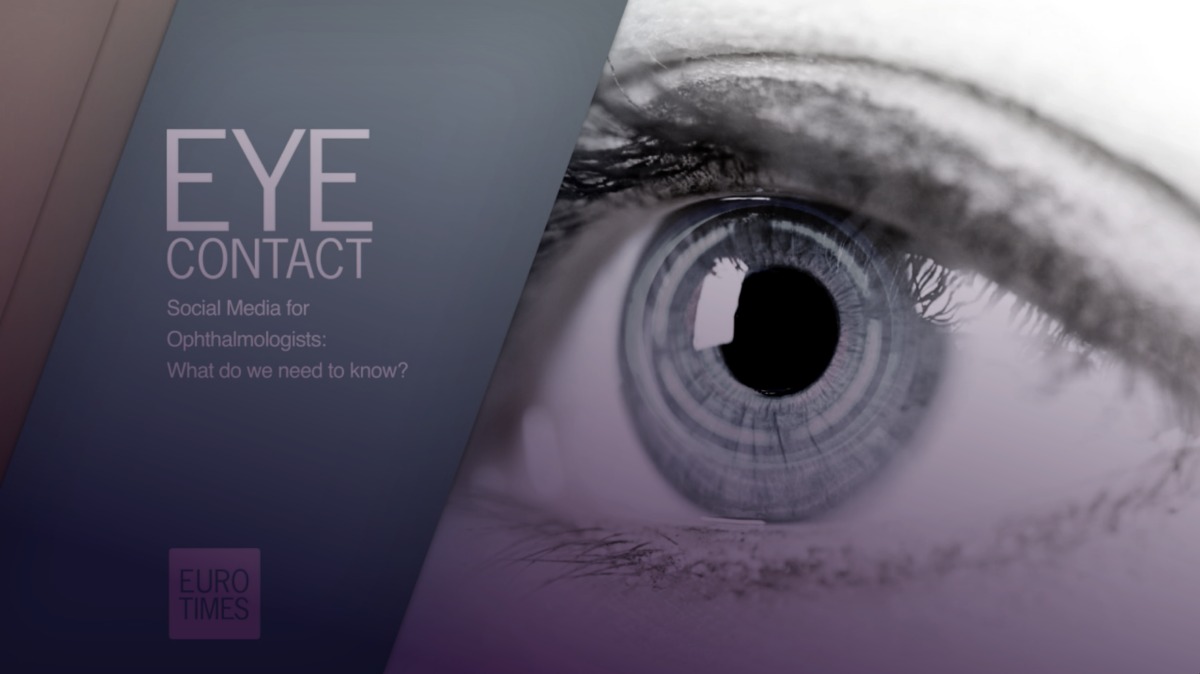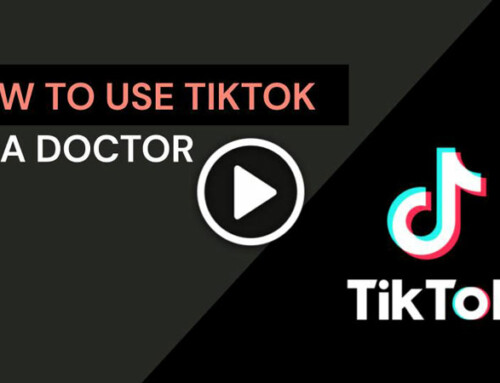Answered: 5 questions about social media marketing you’ve been dying to ask
Should ophthalmologists use social media marketing today?
In this video, Kristine Morrill interviews Rod Solar about social media marketing. They cover common questions that we hear every week from doctors who are trying to figure out how best to leverage this channel (if at all!) Watch the video to get helpful answers to these questions:
- Should we (eye doctors) bother using social media marketing?
- Who should handle an ophthalmologist’s social media for their practice?
- Is social media a *must* in marketing today?
- What should ophthalmologists concern themselves with when using social media?
- What’s on the horizon for social media? What trends should ophthalmologists be preparing for?
EuroTimes filmed this video at last year’s Congress of The European Society of Cataract and Refractive Surgeons (ESCRS) in Portugal (October 2017).
The full transcript follows the video, edited for readability.
Video Transcript
Speaker Key:
- KM – Kris Morrill
- RS – Rod Solar
00:00:000
KM: Welcome to Eye Contact, the video news programme on issues and controversies in ophthalmology sponsored by EuroTimes. I’m Kris Morrill. Social media is playing an increasingly important part in helping ophthalmologists communicate with their patients. Today I’m talking to Rod Solar of LiveseySolar Practice Builders on how eye surgeons could get maximum benefit out of platforms like Facebook and Twitter. Welcome, Rod.
00:00:31
RS: Thanks.
KM: So let’s ask the easy stuff first.
Why should ophthalmologists consider using social media?
RS: Well, any question in marketing, including social media, depends on one’s goal. If an ophthalmologist intends to market to millennials, for example, I would say that that’s the primary target market when considering using social media as a channel to generate effective referrals. The typical things that one might be marketing to millennials are laser refractive surgery.
00:01:05
When one considers looking at a market that older, like Generation X, certainly they’re very much on social media as well. But they’re probably using slightly different social media platforms. Millennials tend to use more of the social messaging approaches, more pictorially based, and live video, whereas Generation Xers tend to be more similar to their boomer relatives where they use a lot of Facebook.
00:01:37
And when you look at boomers, say, for example, if you’re marketing anything for the presbyopic market or anything regarding the initial advance of age-related vision loss, they’re going to be mainly on Facebook. Therefore, that’s going to be an area where it might make sense to invest. It’s interesting because Facebook is a high-trust environment as opposed to, say, for example, Twitter who, where you might interact with people you don’t know.
00:02:04
But at the same time, baby boomers might not be as connected as younger people are in social media. Therefore, paying for sponsored ads on Facebook might make more sense if you’re trying to get the impressions you need to generate referrals. If you’re marketing services to traditionalists, which are people aged 73 and over, then in that particular circumstance it’s perhaps a bit of a stretch to expect that many of them will be on social media.
00:02:34
However, let’s not forget that their adult children do play a part in influencing their parents when it comes to deciding a provider. They will most likely look at the social media profiles of their intended providers to see if what they’re up to and what kind of reputation they have.
KM: Right. So it’s very important then to think about breaking down the patient population and understanding what social media channels will work rather than assuming a one-size-fits-all approach.
00:03:05
RS: Absolutely. There are channels, and there’s also the message regarding how authentic one wants to be. Millennials love authenticity. They want you to be yourself. However, traditionalists might prefer a more idealised version of what a medical practitioner ought to look like, sound like and what they ought to say. One’s messaging, and one’s approach changes, not just the channel.
00:03:30
Who should be handling the social media in ophthalmic practice?
Should the ophthalmologist be involved, or is it somebody designated in the team who has that kind of experience?
RS: That’s a great question. I think that the ophthalmologist can be involved if they have some familiarity with social media already. Here’s a good test: If the ophthalmologist already enjoys social media and gets something out it. Let’s say they have a Twitter account.
00:04:00
They perhaps relate to other people by retweeting messages or liking other messages. Maybe they’re on Facebook and they get a lot out of it. They understand the platform because they’ve lived there for a bit. Then, it makes sense. As well, I would also say that it might make more sense in the millennial market because millennials are going to be a lot more forgiving of perhaps a surgeon’s – authentic traits – if I can put it that way.
00:04:30
Whereas on the hand, if you’re marketing to an older market, it might be a little bit less interesting for them to get to know their surgeon too well if that makes sense. They want that professional distance. They’re used to that, and they’re comfortable with that. They don’t need to know that the surgeon’s going off to conferences even and doing things other than taking care of them. So that’s a consideration. It makes sense, if they’re already familiar with social media and if they already enjoy it, that they can have an involvement in it. And, I think that authenticity does trump the distance in many cases.
00:05:01
Alternatively, because many surgeons are time poor, and let’s not forget social media takes a lot of time to do properly, one can’t just post a message here and there twice a week and expect to get any return on that. When you look at the time investment, sometimes it makes more sense for somebody in the practice to do it. Again, that has to be somebody with an awareness of how the practice wants to be perceived externally. This can’t be handed out to just the receptionist on their free time unless they have some training on it.
00:05:35
Or, especially not an intern who one can simply say, “oh, look, you’ve got a good Instagram account. Why don’t you take over our social media?”
We have to remember that it is a marketing channel; that it represents the practice. It doesn’t have to be all professional all of the time, but certainly, it needs to be communicating with one voice and one message that everybody can get behind. So yes, either way, whether it’s a surgeon or whether it’s a practice manager or whether it’s somebody in the clinic, they should know about social media, they should enjoy social media, and they should have a plan.
00:06:06
If they have a plan, then they’re more likely to do the right things, regardless of whether or not other things get in the way. And we all know that in many practices other things will get in the way. So, a plan is key.
KM: Every year for the past five, six years, you and I have presented this practice development programme, and one of us usually asks for a show of hands about who’s using social media.
00:06:30
And each year the, a few more hands go up. But it’s not everybody in the room.
Should ophthalmologists feel that is a ‘must-do’ as part of their marketing today?
Are you missing a segment of the population by not doing social media?
RS: Yes. I can be categorically sure about that. If you’re not on social media, you are missing an opportunity to communicate with a significantly large segment of the population.
00:07:02
Email used to be one’s favourite communication channel of choice. Many people that are 35 and under have almost abandoned email with the exception of professional use. When they’re doing things personally, when they’re searching for medical advice online, or when they’re interested in the types of treatments that they have an interest in, they’re going to go to social media.
00:07:33
They’re going to use the channels that they’re familiar with, and they’re going to interact with people who they know on social media. Absolutely, ophthalmologists are missing a trick if they’re not on social media. I think it’s vital. At the same time, we have to be realistic that social media is a channel that often leads to engagement on a website that then can lead to engagement over the telephone, which then can lead to engagement in person.
00:08:01
Which is where you want the patient to be, at the end of the day, in your office. We can’t necessarily expect social media – at the moment – to be a generator of patients on a consistent basis. However, we know, from looking into the Far East where social media is now very, very popular and has been adopted widely, that people in the Far East are using social media to book consultations online. Because we see that, we know that typically what happens in the Far East is generally followed by America.
00:08:33
And then, what happens in America is generally followed by Europe, at least in the social media world. We can expect that to happen eventually.
Help your practice survive Coronavirus
SCHEDULE A FREE 15-MINUTE CHAT
Your business has completely new challenges today in light of COVID-19. Let’s chat about how you you can quickly change your plan and your patient messaging to be in sync with the 5 phases your market is going through right now. You cannot act as though this is business as usual. Let’s have a quick chat to get your practice protected
What about ophthalmologists who have concerns about using social media from an ethical standpoint?
And one of those areas would be engaging with potential patients who reach out via Facebook, Twitter and trying to engage in almost the practice of medicine.
RS: This is a widespread concern.
00:09:01
I completely appreciate it because I think any doctor is used to the environment of talking one-to-one with someone. The typical scenario that I try to put to an ophthalmologist who has these concerns is like this: I say
Imagine that you’re sitting in your patient waiting room and you got a whole bunch of patients in front, maybe about a couple of dozens. And you’re answering some questions. Perhaps it’s like a seminar environment. Now take that environment and imagine that everything that’s being discussed by the patients, prospective patients and yourself is broadcast on every single radio station in the area. Not only that, but there are also cameras, and they’re broadcasting everything that’s happening on television as well. So anything that you feel comfortable saying in that scenario, anything that you feel is necessarily private in that scenario, that’s what you have to imagine is the potential scope and reach of social media.
00:10:01
I’m not necessarily saying that social media is as ubiquitously seen as television or heard as radio. But it has the potential to be. So, if something negative happens on social media that captures the attention of people to the point where it goes viral (and we’ve all seen and heard things that we all laugh at and sometimes groan at and grimace at), this is definitely not what we want to do. This is especially true if it’s something we don’t want representing our practice correctly.
00:10:29
So yes, I can appreciate that concern, and I would advise ophthalmologists that anything they might say in a public setting needs to be considered equal to the way they might say it in a social media setting. I think, with that rule in mind, they really can’t go wrong.
KM: And finally, Rod, what are the new social media platforms, the new trends that are coming on the horizon? You mentioned that millennials don’t use email any more. They’re into messaging—that type of thing. So what’s coming in the next 18–24 months?
00:11:04
RS: Yes, that’s an excellent question. I usually think when we think of social media – especially those of us who use it from a business perspective and not perhaps don’t necessarily live there – we think Facebook, Twitter, LinkedIn, and to a lesser extent, much lesser, extent Google+ and perhaps YouTube. So those are the big five that we think about. But there are many emerging social media platforms.
00:11:30
Now, the thing about social media platforms is that I’m hesitant to suggest any particular brand names that are coming up because they come and go so quickly. And, there are so many little niche ones that only appeal to, for example, people who have an interest in anime. There’ll be a social media just for that.
However, I’ll talk about some trends. The first trend that we see a lot of is, as I said earlier, social messaging. Anywhere people are, instead of looking at setting up a profile and just talking out to people and saying, ‘here’s what’s happening in my day and here’s what happened at work and this is what I had for breakfast.’
00:12:06
Instead of doing that, millennials are very much looking at using social media as a social messaging platform. So things like WhatsApp 11 and things like Facebook Messenger 12. Together with some Asian properties users on social messaging far outstretch the number of users on Facebook 13 and Twitter 14 at the moment. So yes…
KM: Really?
00:12:30
RS: It’s enormous, and so we have to really consider WeChat15. We have to consider that social messaging has very much arrived and it’s somewhere we need to look at. Another trend that we see happening quite a lot is live and authentic video. So things like YouTube Live and Instagram My Story and Twitter Periscope. These live video facilities offered by the main social media platforms are taking off.
00:13:04
And one of the main reasons for that is because millennials value authenticity almost above everything else. And it’s tough to fake it when you’re on video, especially if it’s live. Anything can happen, and that’s why people tune in. Because they want to look at a real person talking about their authentic selves and what they offer and without all of this manufactured background and… It’s the opposite of fake news if you like.
00:13:29
A third one that we see a lot of talk about, perhaps not so many applications yet, but there’s a lot of investment going on into it which suggests that it’s going to come soon, is virtual reality and augmented reality. Facebook is already working very, very concentratedly on developing a spaces area where they will be able to offer a virtual reality experience. So how might this work for practices? Well, imagine what this might do to what we know now as telemedicine?
00:14:01
Imagine inviting somebody into your practice and having them walk around it. And it goes well beyond a virtual tour because they’re interacting with people who are in the practice. This creates a virtual reality experience, which might lead to perhaps more adoption.
KM: Great. Thank you so much, Rod, for joining us.
RS: You’re very welcome.
00:14:26
Do you use Facebook?
Like and follow our Facebook Page HERE to grow your private healthcare clinic with hundreds of other healthcare marketers.
If you enjoyed this post, you can also get updates from us. We’ll send email updates about new posts, and tips and tricks to build the practice and life you love. Just sign-up as a blog subscriber and you’re good!
Can I make a tiny request?
I know most people don’t share blog posts because they feel that us bloggers don’t need their “tiny” social share. But here’s the truth…
We built this blog piece by piece, one small share at a time, and we will continue to do so. So, thank you so much for your support, dear reader.
A share from you would seriously help a lot with the growth of this blog. It won’t take more than 10 seconds of your time. The share buttons are right here. 🙂
Why subscribe?
If you like our content but feel too busy to remember to keep coming back to our blog just in case we’ve published a new post, subscribe and you too will receive weekly notifications linked to relevant and timely advice about how to build the practice and life you’ll love. We’ll also throw in some subscriber-exclusive content that will enable you to stay ahead of the competition. We’ll keep your email address private and you can unsubscribe at any time.
Subscribe and get:
- Powerful tips in succinct and timely articles
- Insightful interviews that educate and inform
- Useful videos that show you how to grow your practice
- Invites to interactive webinars that teach real-world techniques
- Case studies that show you how we reliably grow your colleague’s practices







